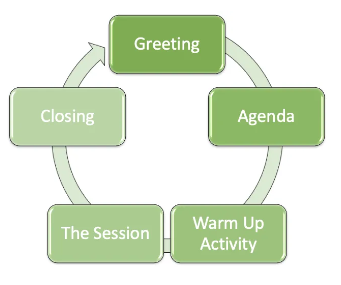Session Planning
Session planning provides the framework SI Leaders use to run efficient and engaging sessions. On this page, we will explore the structure of an SI session, and how to plan one effectively.
Session Planning Hack
Want to plan a solid session? Check out the hack and corresponding prompting questions below.
Session Planning Hack: The SI Cycle*

The SI Cycle is a framework that is utilized in EVERY SI session. Think of the SI Cycle as a skeleton for your session planning. It is there to help decrease the stress of planning for SI Leaders while increasing consistency across every session, and to keep the session flowing. You are free to implement whatever learning modalities you wish, as long as they fit in with the SI Cycle. There is a reason that this framework is a cycle. Each component that is implemented in the session should build upon one another. The cycle does not end at the closing, but cycles back to the greeting. This should clue students into the fact that SI is not a one-time service, meaning that they should return back for the next session. The SI cycle also sets clear guidelines and a strong structure for Sessions, and differentiates SI from other forms of peer academic support, such as tutoring.
*Adapted from Fresno State University SI.
Session Planning Prompts
Want to think through your session on a deeper level? Check out the Session Planning Prompts below to guide your session planning process. Molly will also be holding collaborative session planning meetings throughout the year.
- What is the most difficult content? (Remember, important is not the same as difficult. There will always be important concepts that you will not have time to address in the sessions. If you try to cover everything, you will create students dependent on you for their knowledge. Instead, we would like to create independent students who can take the study skills they learned in SI and apply them to their future courses.)
- (Learning Strategy) For In-Person: Which tools or activities would work well to review this content? Buzzers for Jeopardy? Mini whiteboards? Board work? Post-It notes? For Zoom: Which online tools/resources would work well to review this content? Jeopardy? The whiteboard feature? Online flashcards? **Remember, it’s okay to start with simple learning strategies and build up your confidence before using fancier tools like Kahoot or FlipGrids. These tools can be fun, but they’re only useful if they truly facilitate/guide the students’ learning rather than complicate it.
- (Collaborative Learning Technique) How will you get the students to review the content together? For In-Person: Think-pair-share? Group discussion? Turn to a partner? For Zoom: Would breakout rooms work well for small group discussion? A large group discussion? Chatter-fall in the chat?
- How much time do you expect to spend on each activity?
- How many students do you expect?
- What will you need to adjust in the strategies you’ve chosen depending on how many students actually attend? How can you be ready for students who are not prepared? (no notes, haven’t read the book, etc.) Make those plans now. What do you need to prepare to make these strategies successful? (i.e. Review your own lecture notes for a note review; make a PPT, write an informal quiz, divide a reading assignment for divide and conquer; pick up index cards for review activities from the LARC supply cabinet; select problems representative of important types to use for think pair share or board work model; form your own complete matrix, etc.)
- What would you like to remind students to study on their own? You won’t be able to cover everything in a session, so think about what students could reasonably review on their own.
Return to the main LARC Handbook Page

